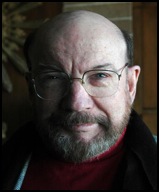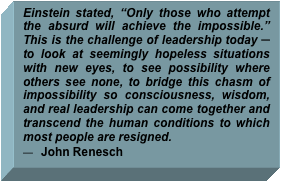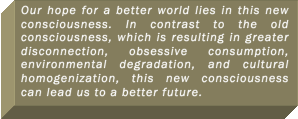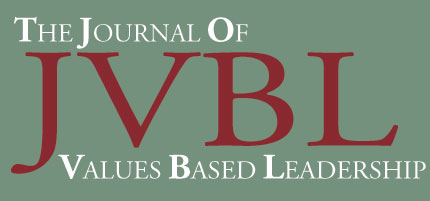- CONTENTS:
- Letter from the EditorTable of ContentsIntroducing Ethics Legislation: The Courage to Lead After 200 Years of SilenceConscious Leadership: Transformational Approaches to a Sustainable FutureEarning the Right to Lead in Defining Moments: The Act of Taking LeadershipThe Moral Foundations of Ethical LeadershipBook Review of Gurus on Leadership
- CONSCIOUS LEADERSHIP: TRANSFORMATIONAL APPROACHES TO A SUSTAINABLE FUTURE

John Renesch, Author, Getting to the Better Future
San Francisco, CA
Introduction
The state of the world is screaming for leadership! Global events of the past few years make it painfully evident that we humans are at a major crossroads. It has been glaringly apparent to any astute social observer that almost every human system is failing to perform as intended; in fact, most are completely dysfunctional. However, the most dominant system of them all - the economic system upon which so many of us depend - was viewed as sufficiently functional to “get mine before it all comes down.” Well, now that one has failed us. The system driving all the other systems we created has crashed. We are out of rationalizations. We are in systems-failure mode - a global integrity crisis.
We all know the list of challenges and crises awaiting future generations so there is no need to specifically address them here. It is time for us to engage in some collective self-examination and take a hard look at what we have allowed to devolve to such an extreme during our lifetimes. Here are a few questions looming before us warranting immediate investigation and dialogue:
- Do we continue to give legitimacy to dysfunctional systems rather than advocating long-term approaches to achieving a sustainable future?
- Do we continue to polarize ourselves instead of seeking common ground and mutual interest?
- Do we continue giving legitimacy to people, groups, and systems that have failed to perform as promised, pretending we are powerless to do anything to change things?
- Do we continue trying to resolve our differences through force and incivility which further divides us or will we insist on reconciliation and conflict resolution that acknowledges our common humanity?
- Will we wake up in time to take corrective measures to this unsustainable, self-destructive course we have embarked upon and continue to perpetuate?
The Conundrum
When I ask these questions during one of my talks, I invite audiences to respond. Typically I hear, “Where do we begin?” or “What can I do?” - questions which are affirmations of powerlessness in drag. Billions of people on Spaceship Earth are headed for substantial negative consequences for our behavior over the years and the crew is arguing for their impotence to make a course correction. Some of us are even opining that there is no need for alarm - that everything will be fine, all the concern is a ruse, and the status quo should be left alone, thank you.
Regardless of the naysayers, continuing to think and behave like we have been is contrary to the best interests of humanity in the longer term. It is a crime against the future, needlessly and wantonly endangering our children, grandchildren, and their children.
There are those who argue that working collaboratively and approaching conditions transformatively is Pollyannaish and unrealistic. And this is an easy argument to make since it is unproven and untested. So it is often dismissed as both impractical and unattainable.
Here is the conundrum: we can choose the insane path to irreversible negative consequences (including the possible extinction of all of Earth’s ecosystems) or be practical and quite possibly fail at trying something new. While this choice has confronted us for several generations, we are seemingly paralyzed and hence, continue on the path of insanity, creating technologies that are enabling us to get there faster and faster. This conundrum tends to generate a resigned, impotent global population. As we become so apathetic that we become career cynics then, the rationale goes, we might as well get all we can until it all blows up.
This mental model deadlock facing us could be seen as a precipice. On the other side of the great chasm before us lies enormous possibility for humanity. Yet there are unknown dangers that lie between the cliffs of today and the shores of tomorrow. Taking that leap to the shores of possibility seems absurd. Einstein stated, “Only those who attempt the absurd will achieve the impossible.” This is the challenge of leadership today - to look at seemingly hopeless situations with new eyes, to see possibility where others see none, to bridge this chasm of impossibility so consciousness, wisdom, and real leadership can come together and transcend the human conditions to which most people are resigned.
Let us look at what appears to be “impractical and unattainable” as well as what seems to be “foolhardy.” Einstein also warned us more than half a century ago that we cannot solve our problems with the same consciousness with which we created them. Yet, maintainers of the status quo continue ignoring his advice.We seem more comfortable risking the future of our children by continuing a path that - while ostensibly perilous - is more familiar than forging a new path that might be wiser and lead to a desired future for our children. In would seem we prefer the familiar - even if it is completely nonsensical - to the unknown. This is arguably what is termed “entrancement” - on a worldwide scale. It is almost as if we have been collectively hypnotized!
So where is the hypnotist who snaps his fingers and brings us back to the real world, who breaks the crippling spell? Where are the people who can to point us in the wiser direction, leading us on this new path, taking corrective measures, and initiating transformative practices?
A New Way of Thinking about Leadership
A different kind of leadership is needed. This new leadership is not necessarily elected, promoted, or appointed. These leaders do not require credentials to ascertain what needs to occur nor to necessarily champion which remedial actions must be implemented. They must not, however, remain silent, condoning, and thereby maintaining, the status quo. These new leaders are not irresponsible anarchists or rabble rousers but rather constitute a breed of more mature, long-term thinkers who have developed a level of consciousness closer to what Einstein was advocating.
“Conscious leadership” is the term I coined some years ago to communicate the quality required of leaders, organizations, governments, businesses, and quite frankly, all individuals to embrace and pursue through these critical junctures which will determine the future our children and grandchildren will inherit. I call it “conscious” because our circumstances call for a higher state of consciousness - a state of mind that includes heightened awareness of what is needed for the whole of humanity to take responsible action. As emphasized by His Holiness, the Dalai Lama: “As people see their predicament clearly - that our fates are inextricably tied together, that life is a mutually interdependent web of relations - then universal responsibility becomes the only sane choice for thinking people.”
From Where Will the Conscious Leaders Come?
When paradigms change, the agents or catalysts for change rarely come from within the core of the system. The established leaders are usually so embroiled in the traditions, beliefs, and priorities of the existing system that they rarely see the need for change - much less initiate it. As former U.S. Ambassador to NATO Harlan Cleveland writes in his book Nobody in Charge, “Those with visible responsibility for leadership are nearly always too visible to take responsibility for change.”
Much like the emperor with no clothes, the new leaders dare to blow the whistle on dysfunctional behavior. They recognize it more readily because of their higher state of consciousness. Sometimes they are able to more readily see the need to change existing circumstances. This new consciousness will be characteristic of people who are not mired down in the system. They did not drink the Cool Aid of status quo and thus are able to demonstrate a broader, more comprehensive perspective.
In contrast to traditional leaders who spend years building résumés, acquiring wealth and power, and engaging in politics to secure new titles and rank, these new, pragmatic leaders already realize the simplicity of what it requires to create a better future.
No widespread educational or re-training programs are required for this transition. Additionally, no substantial capital investments are critical. No expert consultants will need to be hired. And it does not require years to implement. An internal shift in consciousness allows new thinking to begin immediately. From this place, more people will be willing to get closer to the edge of the precipice…and subsequently take the next step. This can happen in minutes! Conscious leaders relinquish their patterns of “going along to get along.” They are no longer willing to condone the norm. This rejection of “business as usual” becomes their rallying cry. That moment of “no more” becomes their turning point, their catalyst, their epiphany - a life-altering event achieved in a millisecond.
A Better Future
Our hope for a better world lies in this new consciousness. In contrast to the old consciousness, which is resulting in greater disconnection, obsessive consumption, environmental degradation, and cultural homogenization, this new consciousness can lead us to a better future.
New consciousness is based on the assumption we are all connected - like leaves on the same tree - not separate entities competing for the same resources.
New consciousness requires looking through a new lens toward the future. The following represent a few comparisons between conscious leadership and traditional leadership:
Traditional Leadership
- Intimidates, rules, manipulates
- Relies on form, structure
- Outer-directed
- Eventually becomes incompetent
- More adolescent, even if highly functional
- Strong persona maintains image
- Politics prevail
- Tends to lead forcefully
- Tends to be dominating
- Protects own image
Conscious Leadership
- Inspires, evokes greatness
- Trusts in Self, other
- Inner-directed
- Continues to grow and learn
- Adult, wiser, and more mature
- Authentic and genuine
- Truth-telling prevails
- Leads with presence
- Possesses dominion, mastery
- Serves those who follow
 Through conscious leadership, we will be able to transcend traditional means of resolving conflict in our world. We can transcend perverse nationalism, elitism, and fundamentalism. Through conscious leadership we can create a way of life that is sustainable so our descendants will inherit a world that is life-affirming and flourishing for everyone. With the help of these new leaders, greater numbers will come to recognize the interconnectedness of all life. What a wonderful future we humans have waiting for us if we can get past this impasse of separateness. We will stand a greater chance of fulfilling a destiny that goes beyond our current level of evolution.
Through conscious leadership, we will be able to transcend traditional means of resolving conflict in our world. We can transcend perverse nationalism, elitism, and fundamentalism. Through conscious leadership we can create a way of life that is sustainable so our descendants will inherit a world that is life-affirming and flourishing for everyone. With the help of these new leaders, greater numbers will come to recognize the interconnectedness of all life. What a wonderful future we humans have waiting for us if we can get past this impasse of separateness. We will stand a greater chance of fulfilling a destiny that goes beyond our current level of evolution.This “better future” is not a fantasy for one person or one group. It is a future which affirms and respects all life. It allows all of humanity to have their basic needs met. It assures our planet will continue to serve as a hospitable home, following democracy pioneer Thomas Paine’s decree:
“My country is the world. My countrymen are mankind.”
Call to Action
All these thoughts are mere academic rhetoric unless there is action to back them up. So, dear reader, what about you? Are you going to continue giving legitimacy to those systems and institutions you complain about? Or are you going to begin speaking out to people who can do something to change things?
Are you ready to embark on a practice of self-discovery, to examine your life and raise your own consciousness so you are sensitive to the pulse of humanity and the power and purity of a responsible global citizenry?
What do you see that needs to be changed? What will you do about it? Now is the time to act. Now is the time to take responsibility and lead the way if you possess the consciousness, the awareness, and the sensitivity to be a conscious leader. The only question remaining is when do you start?
Author Biography
John Renesch is businessman-turned-futurist, having founded or co-founded several enterprises over a thirty-year career. These include several not-for-profit organizations. In the early 1980s, he started directing his work to organizational transformation with a healthy curiosity as to why people were not as functional in organizations as they would normally be individually. He has since published a dozen books and hundreds of articles in journals and magazines on system change, improved leadership capacities, and large scale transformations.
Renesch is one of the founding advisors to the Presidio Management School (which offers “green” MBA degrees), has guest-lectured at the business schools at Berkeley, Stanford, USF, and several international schools, is a past Managing Director and founding trustee of the World Business Academy and board member of the International Spirit at Work Awards. He is presently a member of the practitioner faculty for the Master in Arts in Organizational Leadership (MAOL) degree program at the Center for Leadership Studies.
As a futurist, he serves on the board of Shaping Tomorrow’s Foresight Network and served as inaugural chair. Additionally, he sits on the international advisory boards of the Acceleration Studies Foundation and the Sustainable Futures Foundation.
Renesch has been interviewed by The Wall Street Journal, The Nikkei Financial Times, Business Week, public radio’s “Marketplace,” CNBC-TV’s Ron Insana on “Management Today Show,” Business Talk Radio, National Public Radio, Forbes, Chief Executive and Industry Week magazines on the subjects of leadership and change. His most recent book is Getting to the Better Future: A Matter of Conscious Choosing.
For more information about his work, visit www.Renesch.com or contact him at www.John@Renesch.com.

